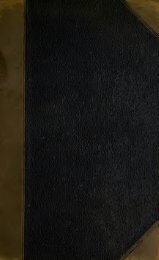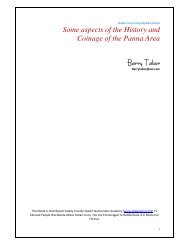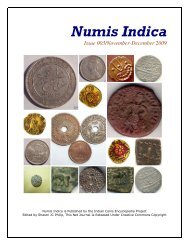Coins In Lucknow Mus. Vol 01 [56 MB - IndianCoins.org
Coins In Lucknow Mus. Vol 01 [56 MB - IndianCoins.org
Coins In Lucknow Mus. Vol 01 [56 MB - IndianCoins.org
Create successful ePaper yourself
Turn your PDF publications into a flip-book with our unique Google optimized e-Paper software.
24 ROMAN COINS.other boars on the obverse the head of an emperor (Decentius or JulianusII ?), and on the reverse VOT. xv. MULT. xx. in four lines within alaurel wreath fastened above with a circular ornament. As regardsthe question how the Roman coins were originally brought to <strong>In</strong>dia,I may with advantage quote extracts from the article by Captain Drury 31to which I have already referred. " ' 'We will now/' he says, consider,in a brief and somewhat imperfect sketch, to what extent and in whatmanner the Roman trade first arose and was subsequently carried onwith the countries of the East, and more especially with that part of<strong>In</strong>dia, to which w*e would more exclusively refer, the Malabar coast,and also what degree of information the Romans actually possessed ofthis part of the country, and what kind of commodities were chieflysought for their luxury or use." Previous to their conquest of Egypt, the Romans derived the benefitsof Eastern commerce indirectly from the merchants of that country,who, under the reign of Alexander and the Ptolemies, monopolised theentire trade of <strong>In</strong>dia and the adjacent countries. Besides this route,the articles of <strong>In</strong>dian produce and manufacture were imported intoEurope by a longer and more tedious way than that cf the Red Sea.Being brought in vessels up the Persian Gulf and Euphrates, they v.conveyed thence across land to Palmyra, then the grand emporium ofEastern commerce, and which, in its central position, became an importantplace from its flourishing and prosperous trade. From Palmyrathe goods were carried to the different ports of Syria, and thence distributedto the various countries bordering on the Mediterranean Sea.At last the Romans, having subjected Greece and Syria to their swayand overcome the Republic of Carthage, made a descent upon Egypt,which soon yielded to the force of their arms, and from this time thatrich and celebrated country was transformed into a Roman province.This happened during the reign of Augustus, and about thirty yearsbefore the birth of Christ." From this time we may conclude that all direct intercourse of theRomans with the East commenced. 32' 'They followed up their victories with that characteristic energy foran increased trade which they ever displayed after the subjection of a31 Journ., As. Soc., Beng., 1851, vol. xx, pp. 376-380.32Dr. G. Oppert writes (Madras Journal of Literature and Science, 1879, vol. xxiv,pp. 209-210) " The more the commerce increased between <strong>In</strong>dia and the Roman Em;:the greater progress was also made in the art of navigation. The Western trade wasviewed in <strong>In</strong>dia with favorable eyes, and the occasional embassies which we IT sent from<strong>In</strong>dia to Roman emperors show this fact plainly. Thus we hear of <strong>In</strong>dian envoys withprecious presents being sent to Augustus, Claudius, Antoninus Pius, and Julianus.' 'With respect to the knowledge concerning <strong>In</strong>dia, it is certain that the author of thePeriplus (Maris Erythryei) did not double Cape Comorin, but Plinius was acquainted withthe Koromandel Coast, and Ptolemy's knowledge embraced Burmah and even ( 'liina.This country was visited by a Greek merchant Alexandros, who "stopped at Kaiiton.Markianos of Heraklea and Ammianus Marcellinus provide on these points still more accurateaccounts. We may, perhaps, be allowed to call Naustathmos (Karaci), Thoophila(Suradara) in Gujarat, Byzantium on the Malabar coast and other places Grecian eoltu>" As long as Rome was the sole capital of the empire, <strong>In</strong>dian goods went from Alexandriamainly to Rome but when the ; empire became divided, Byzantium, or as it is now:called Constantinopolis, participated in the receipt of the Eastern articles. Amongmerchants who met in Alexandria, many Hindus were to be found, though thethe river-god <strong>In</strong>dus in that town was probably the gift of a Greek and not of a Hindu.The presence of Brahmans is even reported from Constantinople."

















